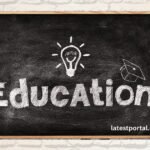Education is crucial for personal growth and societal development. It empowers individuals with knowledge and skills for a better future.
Education shapes the foundation of a prosperous society by fostering critical thinking, innovation, and social cohesion. It equips individuals with essential skills, enhancing job opportunities and economic stability. Knowledge gained through education promotes informed decision-making and problem-solving abilities. Schools and educational institutions play a vital role in nurturing young minds, preparing them to face life’s challenges.
Educated citizens contribute to societal progress, driving technological advancements and cultural enrichment. Investing in education leads to a more equitable and progressive world. As a cornerstone of personal and communal success, education remains an invaluable asset.
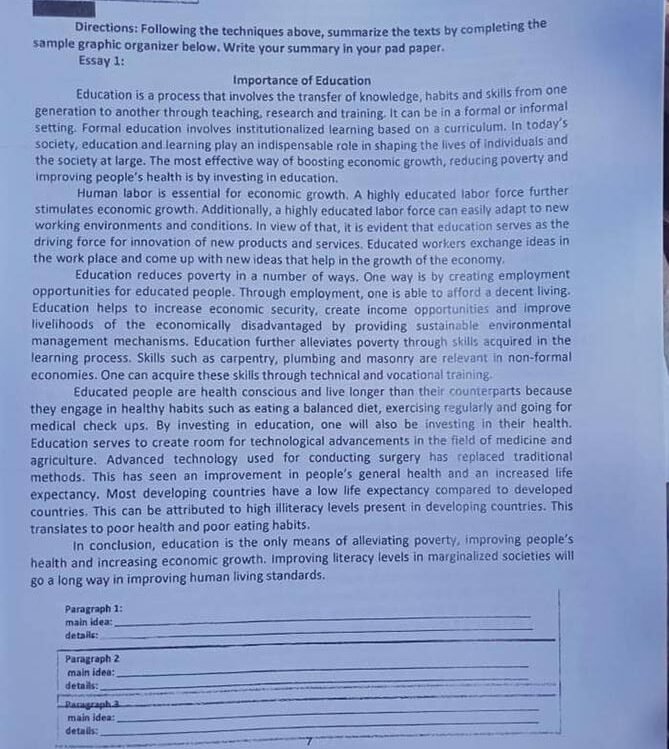
Credit: brainly.com
Importance Of Education
Education plays a crucial role in shaping our future. It provides the tools needed for personal success and societal progress. Understanding the importance of education can help us appreciate its value in our lives.
Foundation For Personal Growth
Education is the foundation for personal growth. It equips individuals with knowledge and skills. This helps them achieve their goals and improve their lives. With education, people can understand the world better. They can also make informed decisions and solve problems effectively.
Personal growth through education boosts self-confidence and self-esteem. It opens doors to opportunities and career advancements. Educated individuals tend to lead healthier and happier lives.
Catalyst For Social Development
Education acts as a catalyst for social development. It promotes equality and reduces poverty. Educated societies are more likely to be stable and prosperous. Education fosters social cohesion and understanding.
Societies with higher education levels experience less crime. They also have better healthcare and economic growth. Education encourages civic participation and strengthens democracy.
| Personal Benefits | Social Benefits |
|---|---|
| Improved self-esteem | Reduced poverty |
| Career advancement | Better healthcare |
| Healthier lifestyle | Economic growth |
Building Knowledge
Education is the cornerstone of personal and societal development. Its role in building knowledge is crucial. Understanding the importance of education helps us appreciate its value in various aspects of our lives.
Enhancing Cognitive Abilities
Education plays a vital role in enhancing cognitive abilities. It helps in the development of the brain, making it more efficient. This improvement leads to better memory and understanding.
Students gain knowledge through various subjects. These subjects include mathematics, science, and literature. Each subject contributes differently to cognitive growth.
Learning new concepts and ideas broadens our thinking. It trains our brain to process information faster. These skills are useful in everyday tasks and problem-solving.
Developing Critical Thinking
Critical thinking is an essential skill developed through education. It helps us analyze and evaluate information. This skill allows us to make informed decisions.
Schools encourage students to ask questions and seek answers. This habit nurtures curiosity and promotes independent thinking. Critical thinking is beneficial in various life situations.
In the classroom, students face different scenarios. They learn to approach problems from multiple angles. This training enhances their ability to think critically and creatively.
The ability to think critically is vital for personal growth. It empowers individuals to make sound judgments. This skill is also valuable in professional settings, contributing to career success.
Career Opportunities
Education opens doors to countless career opportunities that would otherwise remain inaccessible. A well-rounded education equips individuals with the skills and knowledge necessary to excel in their chosen fields. This section delves into how education provides access to better jobs and higher earning potential.
Access To Better Jobs
With a solid educational background, individuals gain access to better job opportunities. Companies prefer hiring candidates with relevant degrees and certifications. This is because educated employees often bring valuable skills and critical thinking abilities to the table.
Many high-paying professions, such as doctors, engineers, and lawyers, require advanced degrees. These fields are not accessible without proper education.
Additionally, educational qualifications often serve as a benchmark for job promotions and career advancements. This means that investing in education can lead to long-term career growth.
Higher Earning Potential
Education significantly enhances an individual’s earning potential. According to numerous studies, people with higher education levels tend to earn more over their lifetimes. Below is a table illustrating average earnings based on educational attainment:
| Education Level | Average Annual Salary |
|---|---|
| High School Diploma | $35,000 |
| Bachelor’s Degree | $60,000 |
| Master’s Degree | $75,000 |
| Doctorate Degree | $90,000 |
As seen from the table, higher education levels correlate with higher salaries. This makes pursuing advanced education a wise financial decision.
Furthermore, educated individuals have a better understanding of financial management. This knowledge helps in making informed decisions, leading to better financial stability and wealth accumulation.
Social Benefits
Education has a profound impact on society. It shapes minds, builds character, and fosters understanding. The social benefits of education extend far beyond individual gain. It creates a more equitable and prosperous society.
Promoting Social Equity
Education acts as a great equalizer. It provides everyone with opportunities. Through education, people from diverse backgrounds gain knowledge and skills. This helps bridge the gap between different social classes. An educated society values equality and fairness. Education empowers marginalized groups, giving them a voice and a platform.
- Access to education for all
- Reduces social barriers
- Fosters mutual respect
Reducing Poverty
Education is a powerful tool against poverty. It equips individuals with the skills needed for better jobs. Educated individuals are more likely to secure stable employment. They can contribute more effectively to the economy.
- Improved job prospects
- Higher earning potential
- Economic growth
A country with higher education levels sees reduced poverty rates. Education creates opportunities for everyone, leading to a more prosperous society.
| Benefit | Description |
|---|---|
| Social Equity | Bridges the gap between different social classes |
| Reducing Poverty | Provides skills for better job opportunities |
Global Perspective
The importance of education extends beyond local communities. It impacts the entire world. Understanding different cultures and global issues is vital. Education plays a key role in this. It helps people see the world with a broader lens. It fosters global citizenship and encourages cultural awareness.
Fostering Global Citizenship
Education helps people become global citizens. Students learn about global issues. They understand the importance of working together. They see how their actions affect the world. This knowledge encourages them to act responsibly. They learn to respect different viewpoints. They become more empathetic and open-minded. Global citizenship education often includes:
- Learning about human rights
- Understanding environmental issues
- Exploring global economic systems
These topics help students connect with the world. They realize that their actions matter. This perspective is crucial for solving global problems. Education is the key to this understanding.
Encouraging Cultural Awareness
Education encourages cultural awareness. Students learn about different cultures. They explore various traditions and customs. This knowledge breaks down stereotypes. It builds respect and appreciation for diversity.
Key areas of cultural awareness in education include:
- Learning different languages
- Studying world history
- Participating in cultural exchange programs
These activities enhance students’ understanding of the world. They see the beauty in diversity. They become more tolerant and accepting. This cultural awareness promotes peace and harmony. Education is essential for fostering this awareness.
Education is a powerful tool for creating a better world. It fosters global citizenship and cultural awareness. These elements are vital for a peaceful and prosperous global society.
Technological Advancements
Education’s importance extends to embracing technological advancements. Technology shapes how we learn and work today. Understanding this connection helps us prepare for the future.
Adapting To Digital World
The digital world is everywhere. Education helps us adapt to this new reality. Learning about computers, the internet, and software is essential. Children and adults need digital literacy to succeed.
- Basic computer skills
- Internet research techniques
- Using educational software
Schools now teach coding and robotics. These skills are necessary in many jobs. Online learning platforms provide education to many people worldwide. Virtual classrooms and e-books make learning flexible and accessible.
Driving Innovation
Education drives innovation. New ideas and technologies come from educated minds. Students learn to solve problems creatively. This fosters innovation in many fields.
| Field | Innovation |
|---|---|
| Medicine | Telemedicine, AI diagnostics |
| Engineering | 3D printing, smart homes |
| Education | Online courses, interactive learning |
Innovation improves our lives. Educated people create new tools and solutions. This advancement benefits everyone.
Health And Well-being
Education plays a crucial role in promoting health and well-being. It equips individuals with essential knowledge and skills for healthier lives. Let’s explore how education impacts health literacy and enhances the quality of life.
Improving Health Literacy
Education helps people understand health information better. They can make informed decisions about their health.
- Understanding medical instructions
- Recognizing disease symptoms
- Knowing the importance of vaccinations
With better health literacy, individuals can prevent diseases and manage existing conditions effectively.
Enhancing Quality Of Life
Educated individuals tend to live healthier lifestyles. They are more likely to exercise and eat nutritious foods.
| Education Level | Health Benefits |
|---|---|
| High School | Basic understanding of health and nutrition |
| College | Advanced knowledge of health practices |
Education also reduces stress by providing better job opportunities. This leads to financial stability and a happier life. In essence, education is a key factor in improving overall health and well-being.

Credit: www.coursehero.com
Lifelong Learning
Education is a journey that never truly ends. Lifelong learning means gaining new knowledge and skills throughout life. This continuous process keeps our minds sharp and prepares us for the ever-changing world. Let’s dive into the specifics of lifelong learning.
Continuous Skill Development
Continuous skill development is essential for personal and professional growth. The world is advancing rapidly, and staying updated is crucial. Here are some ways to develop skills continuously:
- Enroll in online courses
- Attend workshops and seminars
- Read books and articles
- Participate in professional networks
These activities help you acquire new skills and improve existing ones. Always look for opportunities to learn and grow. Remember, learning should be a lifelong commitment.
Adapting To Change
The ability to adapt to change is a vital part of lifelong learning. Change is constant in today’s world, especially in technology and work environments. Being adaptable ensures you remain relevant and competitive. Here are some tips to adapt to change:
- Stay informed about industry trends
- Embrace new technologies
- Be open to new experiences
- Learn from feedback
Adapting to change helps you navigate the uncertainties of life. It also prepares you for future challenges and opportunities. Embrace change as an essential part of growth and learning.
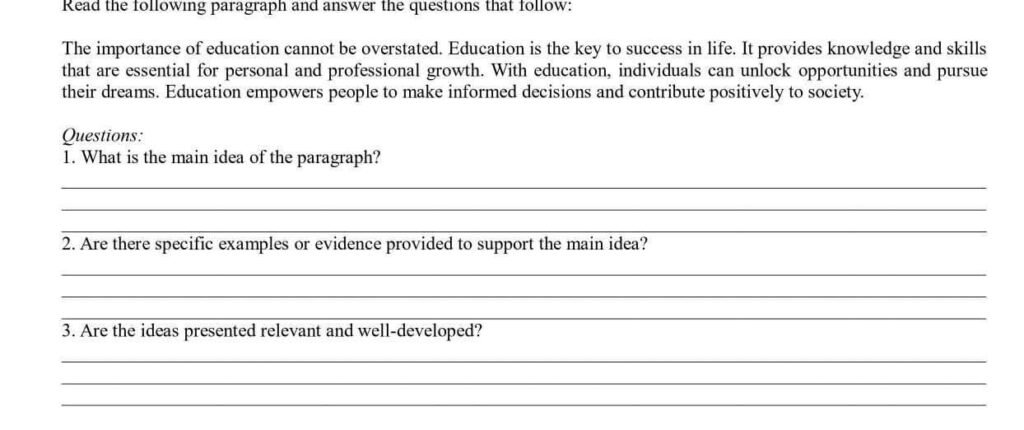
Credit: studyx.ai
Frequently Asked Questions
What Are The Main Ideas Of Education?
Education focuses on knowledge acquisition, critical thinking, personal development, and social skills. It aims to prepare individuals for life and work.
Why Is Education Important?
Education builds knowledge, skills, and critical thinking. It opens career opportunities and enhances personal growth. It fosters informed citizens and drives societal progress.
What Is The Idea And Concept Of Education?
Education imparts knowledge, skills, and values to individuals. It fosters critical thinking, creativity, and personal growth. Through structured learning, education prepares people for careers and societal contributions. It promotes lifelong learning and adaptability in an ever-changing world.
What Is The Central Idea Of The Essay The Function Of Education?
The central idea of the essay “The Function of Education” is that education should develop critical thinking and prepare individuals for societal contributions.
Conclusion
Education shapes our future by fostering knowledge, skills, and values. It empowers individuals and strengthens communities. Understanding its importance helps us prioritize learning and growth. By valuing education, we pave the way for a brighter, more informed future. Invest in education to unlock endless opportunities and create a better world for all.
- India All State Medical Colleges List 2024

- Top 20 Ranking MEdical Colleges in India 2024

- What is the Main Idea of Importance of Education: Unlocking Future Success

- How Do You Know If Learning Has Taken Place: Key Indicators

- How to Become an Education Specialist in South Africa: Expert Guide
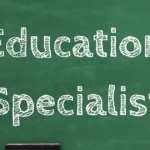
- What is the Difference between Education And Value Education: Explained
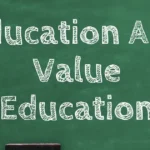
- How Much Does Education Improve Intelligence: Meta-Analysis Findings
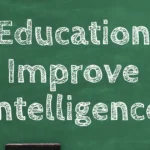
- How Do You Know If Learning Objectives were Released: Key Indicators
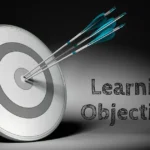
- How to Measure the Effectiveness of an Educational Program: Proven Methods
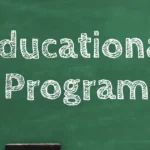
- Can Education IRA Be Used for Room And Board?: Uncover the Facts

- What Do You Think the Purpose of Education is: Unlocking Potential

- When is the Best Time to Get an Education Quizlet: Top Tips
